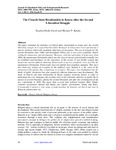The Church-State Relationship in Kenya after the Second Liberation Struggle

View/
Date
2016Author
David, Stephen Kioko
Katola, Michael T.
Kamwaria, Alex
Metadata
Show full item recordAbstract
The paper examinedthe dynamics of Church-State relationship in Kenya after the second liberation struggle. It is argued that the public theologiesin Kenyahave been experiencing a process of decay albeit with seemingly faint hope of resurgence. The era of struggle for thesecond liberations (late 1980s and throughout 1990s) saw a very active prophetic church calling for democracy and development. However, with the realization of democracy from 2000, the mainstream Christianity which was the voice of masses relaxedandeventually lost its credibility and legitimacy as the conscience of the society. It wasfurther arguedthat despite the current euphoria depicting Pentecostals as the new prophetic voice, just like the mainstream Christianity, Pentecostals have not upheld their prophetic mandate. They have also been easy targets of co-option by the political class. Indeed,it is the voice of the mainstream Christianity thatis beginning to resurface. The paper also highlightedthat the death of public theologieshas also negatively affected democracy and development. The study of Church and state relationship in Kenya requires retracing history in order to understand the ever changing and evolving roles of the Christian churches in public life in pursuitof second liberation, during the second liberation and after the promulgation of the new constitution in 2010.The paper then coveredfour political regimes (Moi, Kibaki, coalitiongovernment(Kibaki and Raila)and Jubilee governments(uhuru and Ruto). Consequently itopeneda wide range of understanding the dynamics of church and state in Kenya in ademocratic era
